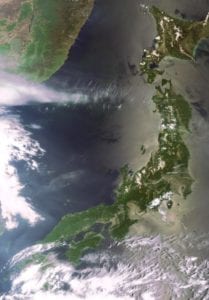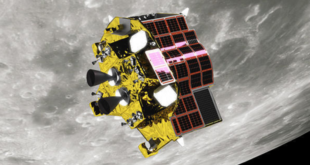
On the occasion of President Emmanuel Macron’s official visit to Japan on 26 June 2019, and in the presence of Frédérique Vidal, Minister for Higher Education, Research and Innovation, and Masahiko Shibayama, Japan’s Minister of Education, Culture, Sports, Science and Technology, Centre national d’études spatiales (CNES) President Jean-Yves Le Gall and JAXA President Hiroshi Yamakawa signed two cooperation agreements concerning exploration of the solar system.
The first of these agreements covers Martian Moons Exploration (MMX), an ambitious mission to return samples from Phobos, one of Mars’ two moons (the other is Deimos). MMX will seek to probe the origins of these moons and thus help scientists to gain new insights into how our solar system formed and evolved. The agreement encompasses technology studies necessary to prepare the mission’s detailed definition (phase B).
The second agreement relates to the Hayabusa-2 mission to which CNES is already contributing with the MASCOT lander that made contact with asteroid Ryugu on 3 October last year. The missions of the Hayabusa-2 probe and MASCOT are to analyse the composition of this celestial body and to collect samples from it. The agreement covers analysis of these samples—to be returned to Earth in 2020—at JAXA’s Extraterrestrial Sample Curation Center (ESCuC) with the French MicrOmega instrument developed by the IAS space astrophysics institute.
President Macron’s visit to Japan also provided the opportunity to draw attention to the framework agreement signed in June with the National Institute of Information and Communications Technology (NICT) on optical telecommunications.
During the visit, Frédérique Vidal and Jean-Yves Le Gall, accompanied by representatives from several research organizations and universities, took part on Thursday, 27 June 2019, in a meeting on French-Japanese cooperation in the field of oceanography and biodiversity at the Japan Agency for Marine-Earth and Sciences Technology (JAMSTEC) and contributed to a roundtable session on cooperation between the two nations in science and technology.





